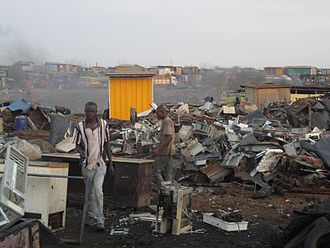
Back Agbogbloshie Catalan Agbogbloshie Czech Elektronikschrottverarbeitung in Agbogbloshie German Agbogbloshie Spanish Agbogbloshie French Agbogbloshie ID Agbogbloshie Italian アグボグブロシー Japanese 아그보그블로시 Korean Agbogbloshie Polish

Agbogbloshie is a nickname of a commercial district on the Korle Lagoon of the Odaw River, near the center of Accra, Ghana's capital city in the Greater Accra region.[1] Near the slum called "Old Fadama", the Agbogbloshie site became known as a destination for externally generated automobile and electronic scrap collected from mostly the western world. It was a center of a legal and illegal exportation network for the environmental dumping of electronic waste (e-waste) from industrialized nations. The Basel Action Network, a small NGO based in Seattle, has referred to Agbogbloshie as a "digital dumping ground", where they allege millions of tons of e-waste are processed each year.[2][3]
The most exhaustive study of the trade in used electronics in Nigeria, funded by the United Nations Environment Programme (UNEP) and the Basel Convention, revealed that from 540 000 tonnes of informally processed waste electronics, 52% of the material was recovered.[4]
According to statistics from the World Bank, in large cities like Accra and Lagos, the majority of households have owned televisions and computers for decades.[5] The UN Report "Where are WEEE in Africa" (2012) disclosed that the majority of used electronics found in African dumps had not in fact been recently imported as scrap, but originated from these African cities.[6] Agbogbloshie is situated on the banks of the Korle Lagoon, northwest of Accra's Central Business District.[7][8] Roughly 40,000 Ghanaians inhabit the area, most of whom are migrants from rural areas.[2][7] Due to its harsh living conditions and rampant crime, the area is nicknamed "Sodom and Gomorrah".[9]
The Basel Convention prevents the transfrontier shipment of hazardous waste from developed to less developed countries. However, the Convention specifically allows export for reuse and repair under Annex Ix, B1110. While numerous international press reports have made reference to allegations that the majority of exports to Ghana are dumped, research by the US International Trade Commission found little evidence of unprocessed e-waste being shipped to Africa from the United States,[10] a finding corroborated by the Massachusetts Institute of Technology, Memorial University, Arizona State University, UNEP, and other research.[11] In 2013, the original source of the allegation blaming foreign dumping for the material found in Agbogbloshie recanted, or rather stated it had never made the claim that 80% of US e-waste is exported.[12]
Whether domestically generated by residents of Ghana or imported, concern remains over methods of waste processing — especially burning — which emit toxic chemicals into the air, land and water. Exposure is especially hazardous to children, as these toxins are known to inhibit the development of the reproductive system, the nervous system, and especially the brain. Concerns about human health and the environment of Agbogbloshie continue to be raised as the area remains heavily polluted.[7][13][14] In the 2000s, the Ghanaian government, with new funding and loans, implemented the Korle Lagoon Ecological Restoration Project (KLERP), an environmental remediation and restoration project that will address the pollution problem by dredging the lagoon and Odaw canal to improve drainage and flooding into the ocean.[15]
- ^ Boakye, Edna Agnes (2021-05-20). "Relocate to Adjen Kotoku within seven weeks – Onion traders in Accra ordered". Citinewsroom - Comprehensive News in Ghana. Retrieved 2021-05-20.
- ^ a b "Time up for Sodom and Gomorrah". Peace FM Online. Daily Graphic. 4 September 2009. Archived from the original on 11 March 2012.
- ^ "Ghana: Digital Dumping Ground". FRONTLINE/World. PBS. Retrieved 3 January 2022.
- ^ Ogungbuyi, Olakitan; Nnorom, Innocent Chidi; Osibanjo, Oladele; Schluep, Mathias (May 2012). e-Waste Country Assessment Nigeria (PDF) (Report). Secretariat of the Basel Convention.
- ^ "World Development Indicators: The information society".
- ^ "Basel Convention: Where are WEee in Africa?" (PDF).
- ^ a b c Safo, Amos. "End of the Road for 'Sodom and Gomorrah' Squatters". News From Africa. Archived from the original on 18 July 2011. Retrieved 15 March 2011.
- ^ Afenah, Afia. "(Re)claiming Citizenship Rights in Accra, Ghana". DPH. HIC (Habitat International Coalition). Retrieved 15 March 2011.
- ^ Hugo, Pieter (July 24, 2011). "Ghana's e-Waste Dump Seeps Poison". Newsweek.
- ^ U.S. International Trade Commission (February 2013). Used Electronic Products: An Examination of U.S. Exports (PDF) (Report). 4379.
- ^ "Multiple Studies Show Used Electronics Exports To Third World Mostly Good". 27 May 2013.
- ^ Ingenthron, Robin. "Basel Action Network Explains the 80%, or 90%, 75% or 50% "Data"". Good Point Ideas.
- ^ "Poisoning the poor - Electronic waste in Ghana". Greenpeace. 5 August 2008. Archived from the original on 11 April 2020.
- ^ Dogbevi, Emmanuel K. (7 June 2010). "E-waste in Ghana – How many children are dying from lead poisoning?". Ghana Business News. Retrieved 3 January 2022.
- ^ "THE ENVIRONMENTAL IMPACT ASSESSMENT [EIA] STUDY FOR THE DREDGING IN THE ODAW BASIN" (PDF). Ministry of Works and Housing: 142. February 2019.
© MMXXIII Rich X Search. We shall prevail. All rights reserved. Rich X Search